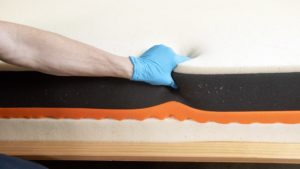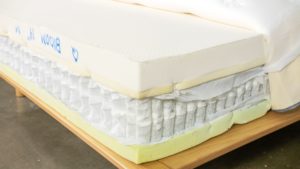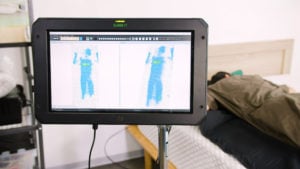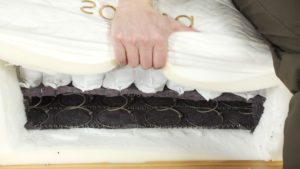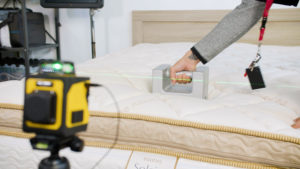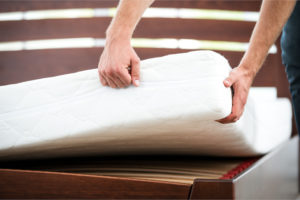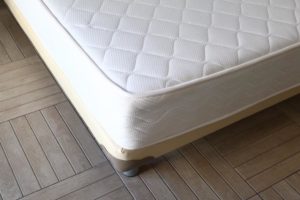When you buy through our links, we may earn a commission. Products or services may be offered by an affiliated entity. Learn more.
How to Check Your Mattress for Bed Bugs
- If you think you may have a bed bug infestation, it’s important to thoroughly check your home, particularly your mattress and furniture. Grab a flashlight and carefully inspect all the folds and crevices of your mattress and furniture for brown bugs, translucent egg shells, or reddish-brown stains. There are several methods to remove bed bugs, including steam cleaning and vacuuming.
Although bed bugs don’t cause any known health problems, an infestation of the small insects in your home can be a stressful experience. The best way to ensure your home is free of bed bugs is to regularly inspect your home for signs of them and take steps to prevent infestations.
However, bed bug infestations can sometimes go unnoticed. If you’ve noticed bites on your body or other signs of bed bugs in your home, there are a variety of solutions involving pesticides or heat treatments that you can use to help rid your home of them.
We’ll discuss where bed bugs come from, how to recognize an infestation, and what to do if you find bed bugs in your home.
Let us help you find the perfect bed
Answer a few questions to find the right mattress for your unique needs
What Are Bed Bugs?
Bed bugs are reddish-brown insects about the size of a poppy seed that feed on blood from humans and other animals. Bed bug infestations have become a common problem around the world. Since they can survive for months without eating, bed bugs can easily spread between locations.
Where Bed Bugs Come From
Bed bugs often make their way into homes and other spaces from other infested items, such as luggage, backpacks, and clothes. Bed bugs can also travel between rooms in apartment buildings and hotels. Since they can hide in seams, folds, and pockets, it can be easy to transport bed bugs into your home without knowing it. Once they’re in your home, they seek out places where people sleep and are typically most active at night.
How Bed Bugs Affect Your Health
While bed bugs are not known to transmit diseases to humans, their bites can still be troublesome. You may find small, red marks on your skin if you’ve been bitten by bed bugs. Some people may have allergic reactions to the bites or experience skin infections from scratching them. If you are extremely uncomfortable or believe you’re experiencing an infection or allergic reaction, contact your doctor.
How to Tell if You Have Bed Bugs
While itchy bites are often the first clue that bed bugs have entered your home, it’s important to look for other signs, as bites can also come from other bugs like mosquitoes. Several signs can help you detect a bed bug infestation.
- Live bed bugs: Seeing bed bugs in your home is a tell-tale sign you have an infestation. Young bed bugs can appear white or clear, while adult bed bugs are a reddish-brown color. Look for bed bugs in your mattress and box spring as well as in the cracks of your bedframe and headboard using a flashlight. Bed bugs are small and can easily fit through small openings and hide in discreet places.
- Shell casings: The skin that bed bugs shed is another indication of an infestation. Look for translucent, hollow shells along the seams of your mattress or in the corners of your furniture.
- Eggs: Although eggs are much smaller and harder to spot than bed bugs, these white ovals signify that bugs are present.
- Fecal or blood marks: Noticing dark spots on your bed or sheets can be a sign of bed bugs. Bed bugs can leave dark brown or black stains on your mattress. If you notice red, rusty blood strains, this could be a sign that bed bugs were crushed.
- Odor: Sometimes a musty, sweet odor similar to the smell of mold accompanies a large bed bug infestation. If you notice an unusual smell but don’t notice any other signs, check for other signs of bed bugs in your bedroom.
- Bites: If you consistently wake up with small, itchy red marks on your body, make sure to thoroughly check your bedding for other signs of bed bugs.
How to Get Rid of Bed Bugs
If you discover bed bugs in your home, there are several methods to get rid of them. These techniques can involve chemicals, heat, or simply vacuuming. Combining approaches can also be effective and make it more likely that the bed bugs won’t come back.
Professional Extermination
The best way to get rid of bed bugs is to call a licensed bed bug exterminator. These professionals inspect your house and customize treatments based on your situation. They typically use a targeted combination of pest control chemicals, vacuuming, and heat to remove the pests. Exterminators tend to be the most expensive option for removal, so you may want to try home remedies first if you’re on a budget.
Steam Cleaning
The high heat from steam can be an effective method for killing bed bugs without the use of chemicals. Move a steamer slowly over all surfaces where you see bed bugs or believe they could be hiding in your home. It’s important to use a high-quality steamer. A clothing steamer may not be powerful enough, but you may be able to rent commercial steamers from a local store.
Vacuuming
If you see bed bugs, you can use a vacuum to remove them from the infested area. Use the strongest suction possible on your vacuum cleaner and use a crevice tool attachment to get deeper into the folds and corners where bed bugs may be hiding. After you vacuum, it’s crucial to remove the vacuum bag from your house immediately and dispose of it so that the bed bugs can’t escape back into your home.
High Heat
Similar to steaming, targeted high heat can effectively eliminate bed bugs from clothing and bedding. Run any items that may be contaminated through your dryer on high heat for at least 30 minutes. You can also use portable heating devices specifically designed to remove bed bugs to apply heat to your belongings. It’s important that the temperature reaches at least 113 degrees Fahrenheit for 90 minutes to kill any potential bed bugs.
Mattress-Safe Insecticides
You can find a variety of mattress-safe insecticides online and at hardware stores that can help kill bed bugs. One method for spraying your mattress is to tidy your room, then flip over the mattress and spray the bottom immediately, targeting any bed bugs before they can escape. You should also wipe down any folds and crevices in the mattress or on any surrounding furniture.
How to Prevent Bed Bugs in Your Mattress
There are several ways bed bugs can find their way into your home. However, there are also a variety of measures you can take to prevent an infestation from happening in the first place.
- Clean your mattress and sheets regularly.
- Use a protective mattress cover or encasement to prevent bed bugs from thriving.
- Frequently vacuum to get rid of any bed bugs that may have snuck inside.
- Keep your home tidy so that bed bugs have fewer places to hide.
- After traveling, check your luggage for any bed bugs and wash your clothes immediately.
- Thoroughly inspect any secondhand furniture for pests before buying.
Dealing With Bed Bug Anxiety
While a bed bug infestation can be worrying, it’s a very common occurrence. Feelings of anxiety and worry are normal. People who experience a bed bug infestation may experience psychological effects such as nightmares, flashbacks, trouble sleeping, and anxiety. If you’re experiencing lingering side effects after a bed bug infestation, consider talking with a therapist.
A big component of bed bug anxiety is the stigma around having an infestation in your home. It helps to know that a bed bug infestation is not the result of poor hygiene and can happen to anyone. Many people experience bed bugs in their home and have successfully removed them.
If you’re too anxious to stay in your own home, consider staying with a friend or family member while the bed bugs are being removed. The best thing you can do is take action immediately to get rid of bed bugs in your home. Most infestations are easily manageable if they’re caught early.

Still have questions? Ask our community!
Join our Sleep Care Community — a trusted hub of sleep health professionals, product specialists, and people just like you. Whether you need expert sleep advice for your insomnia or you’re searching for the perfect mattress, we’ve got you covered. Get personalized guidance from the experts who know sleep best.
Medical Disclaimer: The content on this page should not be taken as medical advice or used as a recommendation for any specific treatment or medication. Always consult your doctor before taking a new medication or changing your current treatment.

